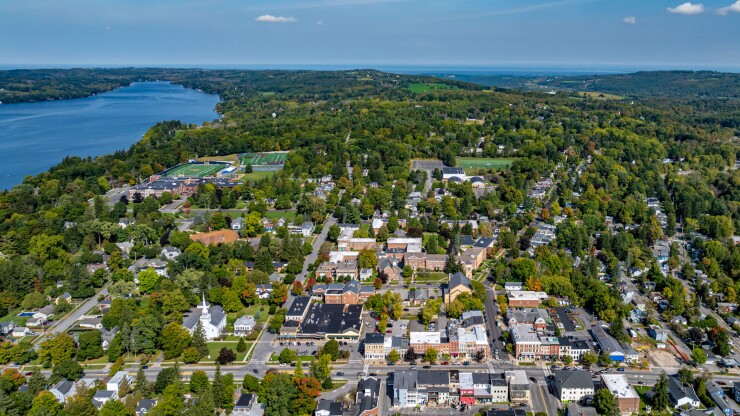
A group of local residents in upstate New York is planning to buy the shuttered Cazenovia College campus for $9.5 million — a sum that, when combined with other funds, is estimated to give the college's bondholders a recovery rate of just over 50%.
Cazenovia, a liberal arts institution, closed in the summer of 2023, amid enrollment pressures facing small schools across the US. It had sold about $25 million of unrated municipal bonds in 2019 secured by school revenues and a mortgage on the campus, which was appraised at $24 million at the time, according to
However, due to the college's remote location in the town of Cazenovia — about 20 miles south of Syracuse — finding a buyer was difficult. The New York State Police even rented the campus as a training facility before a buyer emerged. Two years after it closed, a group of locals agreed to the $9.5 million price tag with plans to revive the campus into a mixed-use development.
Those funds, along with other distributions made to investors and cash in reserve funds, mean that bondholders stand to recover about 52% of the $25 million of debt outstanding, according to an estimate calculated via information from securities filings and data compiled by Bloomberg. The sale is pending approval from the New York Attorney General before it can close.
The bond trustee, UMB Bank, declined to comment.
The largest asset for colleges is typically their real estate, meaning the value of the property is key to how much bondholders will recover if the school closes and its holdings liquidated.
Location is a major part of that calculation and holders can recoup their investments completely if the campuses are located in attractive areas or there's a partner nearby that steps in, said Lisa Washburn, managing director at Municipal Market Analytics.
For example, investors in debt issued by Holy Names University in Oakland, California — where real estate is more desirable — were essentially
But when there are no other solutions for colleges, recoveries are typically based on the real estate value. Recovery rates can also be much lower in past cases, below 20%, according to Washburn.
"It runs the gamut and it comes down to real estate value and what can be done with the property and the land," she said.
While the Cazenovia campus was appraised at $24 million, bond documents noted that the value of the property under a foreclosure was unclear.
"It cannot presently be determined with certainty what the value of the mortgaged property would be in the event of foreclosure under the mortgage, especially in light of the fact that the mortgaged property is improved specifically for use as an independent college," offering documents stated.
The Cazenovia buyers are led by Kate Brodock, who said the group of local investors put in its first bid for the campus in the fall. The process included lengthy negotiations with bondholder representatives, she said in an interview.
The campus is being purchased through a separate entity called Matta Fresca LLC. The plan is to turn the property into a multi-use area with apartments and offices. They also plan to preserve the college's equestrian center, Brodock said.
Brodock said she sees a lot of potential with turning dorms into apartments in particular. "Housing in central New York is in huge demand," she said. "As we move forward, we can flex in either direction — housing or office space — depending on what opportunities we have in front of us."
The revival of the campus could also be a boon economically for the town. Cazenovia College was a major employer, and its closure affected over 500 employees, according





